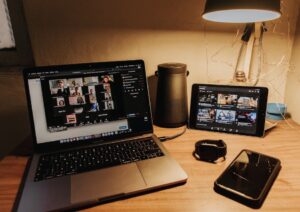Work.
How do we define it? How does it define us?
Is it a place? Is it an environment? Is it an attitude?
These questions will be increasingly important as we move into the post-pandemic future, where collectively, we’ve all had to adapt and adopt a different way of working.
The ‘new normal’ as a phrase has now crept into much of our day to day vernacular, as Covid, has (in some way) affected almost everybody; with work being something that has been majorly disrupted for many of us.
Disruption however, isn’t necessarily bad; Disruption often forces positive change – and possibly even pushing some of us out of our comfort zones into doing things we thought we weren’t capable of, or may not have even considered.
If you consider Covid as one huge experiment – you might have noticed that we aren’t quite as resistant to change as we might have previously thought.
Technology has played a crucial role in our ability to overcome many of the hurdles that Covid has put in place.
Historically, times of war have catalysed leaps in technological advances and although not a war in the typical context, Covid has had a similar effect.
It’s arguable that the past few months in and out of lockdown would have certainly been more difficult if it weren’t for the technologies that have been able to bring us together in both our personal and work lives. Can you imagine if this pandemic had happened in the mid 90s? If we were lucky enough to have a computer at home, internet connectivity (bandwidth and reliability) wouldn’t have been anything like we’ve experienced in the past 12 months. And the late ‘90s wasn’t so very long ago.
It’s now been proven that we can work from home at scale, there are far fewer technological barriers – so the question is more about whether we want to? It’s a matter of personal choice and It’s entirely subjective. There are several factors that can make working from home a great prospect for some and not for others – even simple things like the chair we sit on, whether we have children, if our living space allows for a suitable place to work in.
The general consensus is that working from home isn’t likely to go away any-time soon – and I think the flexibility to do that can only be a good thing. The past 12 months has shown that for many of us, the ability to work remotely and flexibly can be overwhelmingly positive in so many ways. We’re also seeing that the long-held fears of reduced productivity haven’t materialised, in fact productivity has increased in many cases. So the lesson here is, as always, if we treat people well and give them something to believe in they will generally do a great job for us. And that’s just as true in the office as it is remotely.
Looking back, the traditional concept of an office environment has continued relatively unchanged for the past 60 or so years. Even though many technologies have promised to revolutionise our working lives, our proximity has largely been confined to a single, static location. The technology to work remotely has been around for at least 10-15 years but it’s taken a pandemic for our behaviours to catch up at scale.
The future is flexible and we can either contest it, or embrace it.
Consider where we’ve come from: it would be common for many of us to endure a gruelling 75+ minute commute every morning, waking up before our family and then getting home late as well – often 4 or 5 days a week. That’s a lot of wasted time, energy and stress and neither the employer nor the employee benefits. We can now work smarter, for example planning to do work that requires individual focus remotely whilst making the most of the collaborative days when in the shared space with our colleagues.
We also get to spend more time with family and friends which can only be a good thing for wellbeing and mental health. In turn that means a happier, more creative and more engaged workforce. Who wouldn’t want that? Many businesses are beginning to explore different ratios of onsite vs remote working so that we get the best of both worlds. In the end, there are no ‘rules’, just what works best for us and our individual businesses.
Moving forward, the end user technology for home workers is only likely to get better – higher definition cameras, tracking cameras if you like to pace around whilst you’re speaking or presenting and improvements to broadband infrastructure including 5G.
Another consideration now front of mind for many businesses (especially those in expensive real-estate areas such as London) is whether to continue with a permanent office or to move to shared spaces. I know many that have taken that approach, others have decided that relocation to a cheaper area is now viable. Questions are already being asked about what will happen to those previously high real-estate areas and initiatives such as conversion to residential are already in play.
The environmental benefits are also to be considered. If we’re to meet the sustainability targets we’re aiming for then maybe there are opportunities, for example in our use of energy or the emissions caused by commuting. When we do the maths the numbers can quickly add up, especially in larger businesses. We may even be able to move the dial on both our cost base and our carbon footprint.
These have been and will continue to be unsettling times for many of us as we adjust to what the future brings. Understanding that each of us responds differently in changing situations is as critical today as it’s ever been. And the good news is that if we get that right we have contented and engaged employees as well as a successful business. I’d say that’s not a bad day at the office, wherever that office may be located.
Applied Change specialises in helping businesses to navigate their way through changing circumstances, from adapting to broader market or technology changes and opportunities to streamlining in order to become more profitable and more competitive. For more information visit https://appliedchange.co.uk/



![Read more about the article [App Friday] LingoDeer helps you learn a language intricately rather than just memorising words](https://blog.digitalsevaa.com/wp-content/uploads/2021/09/Image7hf9-1630579400078-300x150.jpg)


![Read more about the article [Year in Review 2021] The Midas year for ESOPs in the Indian startup ecosystem](https://blog.digitalsevaa.com/wp-content/uploads/2021/09/ESOPs0-300x150.jpg)

![Read more about the article [Funding alert] AGRIM raises $10M in Series A led by Kalaari Capital](https://blog.digitalsevaa.com/wp-content/uploads/2022/02/agrim-P-1645083738622-300x150.png)

